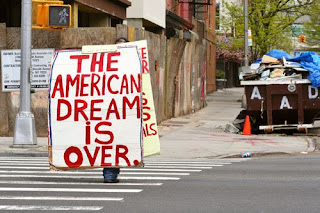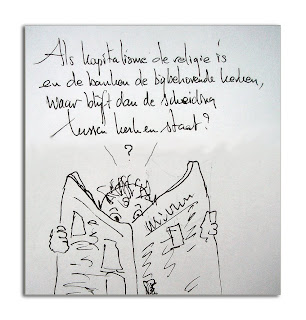 Een van de grootste journalisten van onze tijd is niet meer. Studs Terkel is gestorven.
Een van de grootste journalisten van onze tijd is niet meer. Studs Terkel is gestorven.Studs Terkel, Listener to Americans, Dies at 96
Saturday 01 November 2008
by: William Grimes, The New York Times
Saturday 01 November 2008
by: William Grimes, The New York Times
Pulitzer Prize-winning author Studs Terkel dies at the age of 96.(Photo: Charles Rex Arbogast / AP)
Studs Terkel, a Pulitzer Prize-winning author whose searching interviews with ordinary Americans helped establish oral history as a serious genre, and who for decades was the voluble host of a popular radio show in Chicago, died Friday at his home there. He was 96.
His death was confirmed by Lois Baum, a friend and longtime colleague at the radio station WFMT.
In his oral histories, which he called guerrilla journalism, Mr. Terkel relied on his enthusiastic but gentle interviewing style to elicit, in rich detail, the experiences and thoughts of his fellow citizens. Over the decades, he developed a continuous narrative of great historic moments sounded by an American chorus in the native vernacular.
"Division Street: America" (1966), his first best seller and the first in a triptych of tape- recorded works, explored the urban conflicts of the 1960s. Its success led to "Hard Times: An Oral History of the Great Depression" (1970) and "Working: People Talk About What They Do All Day and How They Feel About What They Do" (1974).
Mr. Terkel's book " 'The Good War': An Oral History of World War II" won the 1985 Pulitzer Prize for nonfiction.
In "Talking to Myself: A Memoir of My Times" (1977), Mr. Terkel turned the microphone on himself to produce an engaging memoir. In "Race: How Blacks and Whites Think and Feel About the American Obsession" (1992) and "Coming of Age: The Story of Our Century by Those Who've Lived It" (1995), he reached for his ever-present tape recorder for interviews on race relations in the United States and the experience of growing old.
Although detractors derided him as a sentimental populist whose views were simplistic and occasionally maudlin, Mr. Terkel was widely credited with transforming oral history into a popular literary form. In 1985 a reviewer for The Financial Times of London characterized his books as "completely free of sociological claptrap, armchair revisionism and academic moralizing."
The elfin, amiable Mr. Terkel was a gifted and seemingly tireless interviewer who elicited provocative insights and colorful, detailed personal histories from a broad mix of people. "The thing I'm able to do, I guess, is break down walls," he once told an interviewer. "If they think you're listening, they'll talk. It's more of a conversation than an interview."
Mr. Terkel succeeded as an interviewer in part because he believed most people had something to say worth hearing. "The average American has an indigenous intelligence, a native wit," he said. "It's only a question of piquing that intelligence." In "American Dreams: Lost and Found" (1980), he interviewed police officers and convicts, nurses and loggers, former slaves and former Ku Klux Klansmen - a typical crowd for Mr. Terkel.
Readers of his books could only guess at Mr. Terkel's interview style. Listeners to his daily radio show, which was first broadcast on WFMT in 1958, got the full Terkel flavor as the host, with breathy eagerness and a tough-guy Chicago accent, went after the straight dope from guests like Sir Georg Solti, Toni Morrison and Gloria Steinem.
"It isn't an inquisition; it's an exploration, usually an exploration into the past," he once said, explaining his approach. "So I think the gentlest question is the best one, and the gentlest is, 'And what happened then?' "
Studs Terkel was born in the Bronx on May 16, 1912, the third son of Samuel Terkel, a tailor, and the former Anna Finkel, who had emigrated from Bialystok, Poland. In 1923 the family moved to Chicago. In the late 1930s, while acting in the theater, Mr. Terkel dropped his given name, Louis, and adopted the name Studs, from another colorful Chicagoan, James T. Farrell's fictional Studs Lonigan.
His childhood was unhappy. His father was an invalid who suffered from heart disease. His mother was volatile and impetuous, given to unpredictable rages that kept the household on edge. "What nobody got from her was warmth and love, or at least not a display of it," Mr. Terkel said.'
Studs Terkel, a Pulitzer Prize-winning author whose searching interviews with ordinary Americans helped establish oral history as a serious genre, and who for decades was the voluble host of a popular radio show in Chicago, died Friday at his home there. He was 96.
His death was confirmed by Lois Baum, a friend and longtime colleague at the radio station WFMT.
In his oral histories, which he called guerrilla journalism, Mr. Terkel relied on his enthusiastic but gentle interviewing style to elicit, in rich detail, the experiences and thoughts of his fellow citizens. Over the decades, he developed a continuous narrative of great historic moments sounded by an American chorus in the native vernacular.
"Division Street: America" (1966), his first best seller and the first in a triptych of tape- recorded works, explored the urban conflicts of the 1960s. Its success led to "Hard Times: An Oral History of the Great Depression" (1970) and "Working: People Talk About What They Do All Day and How They Feel About What They Do" (1974).
Mr. Terkel's book " 'The Good War': An Oral History of World War II" won the 1985 Pulitzer Prize for nonfiction.
In "Talking to Myself: A Memoir of My Times" (1977), Mr. Terkel turned the microphone on himself to produce an engaging memoir. In "Race: How Blacks and Whites Think and Feel About the American Obsession" (1992) and "Coming of Age: The Story of Our Century by Those Who've Lived It" (1995), he reached for his ever-present tape recorder for interviews on race relations in the United States and the experience of growing old.
Although detractors derided him as a sentimental populist whose views were simplistic and occasionally maudlin, Mr. Terkel was widely credited with transforming oral history into a popular literary form. In 1985 a reviewer for The Financial Times of London characterized his books as "completely free of sociological claptrap, armchair revisionism and academic moralizing."
The elfin, amiable Mr. Terkel was a gifted and seemingly tireless interviewer who elicited provocative insights and colorful, detailed personal histories from a broad mix of people. "The thing I'm able to do, I guess, is break down walls," he once told an interviewer. "If they think you're listening, they'll talk. It's more of a conversation than an interview."
Mr. Terkel succeeded as an interviewer in part because he believed most people had something to say worth hearing. "The average American has an indigenous intelligence, a native wit," he said. "It's only a question of piquing that intelligence." In "American Dreams: Lost and Found" (1980), he interviewed police officers and convicts, nurses and loggers, former slaves and former Ku Klux Klansmen - a typical crowd for Mr. Terkel.
Readers of his books could only guess at Mr. Terkel's interview style. Listeners to his daily radio show, which was first broadcast on WFMT in 1958, got the full Terkel flavor as the host, with breathy eagerness and a tough-guy Chicago accent, went after the straight dope from guests like Sir Georg Solti, Toni Morrison and Gloria Steinem.
"It isn't an inquisition; it's an exploration, usually an exploration into the past," he once said, explaining his approach. "So I think the gentlest question is the best one, and the gentlest is, 'And what happened then?' "
Studs Terkel was born in the Bronx on May 16, 1912, the third son of Samuel Terkel, a tailor, and the former Anna Finkel, who had emigrated from Bialystok, Poland. In 1923 the family moved to Chicago. In the late 1930s, while acting in the theater, Mr. Terkel dropped his given name, Louis, and adopted the name Studs, from another colorful Chicagoan, James T. Farrell's fictional Studs Lonigan.
His childhood was unhappy. His father was an invalid who suffered from heart disease. His mother was volatile and impetuous, given to unpredictable rages that kept the household on edge. "What nobody got from her was warmth and love, or at least not a display of it," Mr. Terkel said.'
Lees verder: http://www.truthout.org/110108Z



























